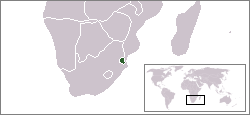LGBT rights in Swaziland
| LGBT rights in Swaziland | |
|---|---|
 | |
| Same-sex sexual activity legal? |
Male illegal since the 1880s Female always legal[1] |
| Discrimination protections | Unknown |
| Family rights | |
| Recognition of relationships | No |
| Adoption | No |
Lesbian, gay, bisexual, and transgender (LGBT) persons in Swaziland face legal challenges not experienced by non-LGBT residents.
Laws regarding same-sex sexual acts
According to Section 252(1) of the Constitution of the Kingdom of Swaziland, the principles and rules of Roman-Dutch Common Law that applied to Swaziland since 22 February 1907 (as those principles and rules existed on 6 September 1968, Independence Day) are applied and enforced as the common law of Swaziland.[2] The principal source of this common law in 1907 was the common law as then applied in the Transvaal Colony, which ultimately became a part of South Africa.[3] Sodomy was a crime under the 1907 common law, punishable with either death or a lesser punishment at the discretion of the court.[4]:page: 262
By the mid-twentieth century, "sodomy" in South Africa had been defined by its courts as "unlawful and intentional sexual relations per anum between two human males."[4]:page: 262 This narrow definition left out a residual group of proscribed "unnatural sexual acts" referred to generally as "an unnatural offence", which included at a minimum those sexual acts between men that did not involve anal penetration[4]:pages: 262–3 and apparently never included sexual acts between women.[4]:footnote: 624, page: 267 Whether these developments in South Africa had an effect on Swaziland's common law is uncertain. The International Lesbian, Gay, Trans and Intersex Association claims that Swaziland's definition of "sodomy" is the same as South Africa's and that female same-sex sexual acts are legal, although the sources it cites cannot be verified through the Internet.[5]
Same-sex marriage
Same-sex couples are not allowed to marry.[6][7]
Adoption of children
Same-sex couples are prohibited from adopting Swazi children. Otherwise, prospective adoptive parents may be single, married, or divorced.[8]
Living conditions
The U.S. Department of State's 2011 Human Rights Report found that,
Societal discrimination against the LGBT community was prevalent [in 2011], and LGBT persons generally concealed their sexual orientation and gender identity. Colonial-era legislation against sodomy remains on the books; however, it has not been used to arrest gay men. Gay men and lesbians who were open about their sexual orientation and relationships faced censure and exclusion from the chiefdom-based patronage system, which could result in eviction from one's home. Chiefs, pastors, and members of government criticized same-sex sexual conduct as neither Swazi nor Christian. Societal discrimination exists against gay men and lesbians, and LGBT advocacy organizations had trouble registering with the government. One such organization, House of Pride, was affiliated with another organization dealing with HIV/AIDS. It is difficult to know the extent of employment discrimination based on sexual orientation because victims are not likely to come forward, and most gay men and lesbians are not open about their sexual orientation.[9]
Summary table
| Same-sex sexual activity legal | |
| Equal age of consent | |
| Anti-discrimination laws in employment only | |
| Anti-discrimination laws in the provision of goods and services | |
| Anti-discrimination laws in all other areas (Incl. indirect discrimination, hate speech) | |
| Same-sex marriages | |
| Recognition of same-sex couples | |
| Step-child adoption by same-sex couples | |
| Joint adoption by same-sex couples | |
| Gays and lesbians allowed to serve openly in the military | |
| Right to change legal gender | |
| Access to IVF for lesbians | |
| Commercial surrogacy for gay male couples | |
| MSMs allowed to donate blood | |
See also
References
- ↑ Where is it illegal to be gay?
- ↑ Section 252(1), Constitution of the Kingdom of Swaziland 2005, page 115
- ↑ "Update: The Law and Legal Research in Swaziland", authored by Buhle Dube and Alfred Magagula, GlobaLex, published by the Hauser Global Law School Program at the New York University School of Law, June 2012
- 1 2 3 4 "Before the law: Criminalizing sexual conduct in colonial and post-colonial southern African societies", appearing as an appendix to "More than a Name: State-Sponsored Homophobia and Its Consequences in Southern Africa", authored by Scott Long, Human Rights Watch and The International Gay and Lesbian Human Rights Commission, 2003
- ↑ "State-sponsored Homophobia: A world survey of laws prohibiting same sex activity between consenting adults" (PDF).
- ↑ "Swaziland told to legalise prostitution, gay marriage", The Zimdiaspora, 19 August 2009
- ↑ "Swaziland: Support Grows for Gay Hate MP", Swazi Media Commentary, authored by Richard Rooney, reprinted at allAfrica.com, 11 November 2012
- ↑ "Intercountry Adoption: Swaziland", Bureau of Consular Affairs, United States Department of State, November 2012
- ↑ 2011 Country Reports on Human Rights Practices: Swaziland, Bureau of Democracy, Human Rights and Labor, U.S. Department of State, page 27